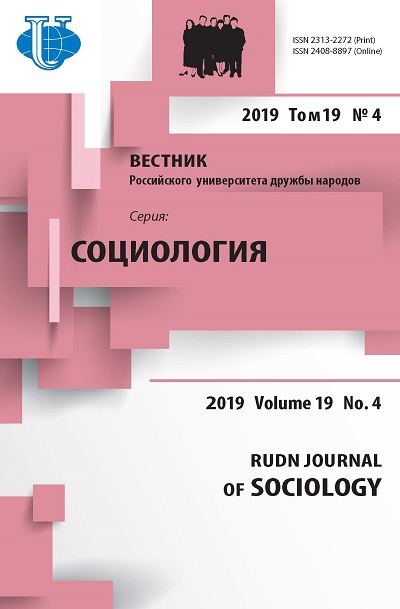The support base of integration processes in the Eurasian Economic Union
- Authors: Osadchaya GI1
-
Affiliations:
- Institute for Socio-Political Research of the Russian Academy of Sciences
- Issue: Vol 19, No 4 (2019)
- Pages: 639-650
- Section: Contemporary society: the urgent issues and prospects for development
- URL: https://journals.rudn.ru/sociology/article/view/22088
- DOI: https://doi.org/10.22363/2313-2272-2019-19-4-639-650
Cite item
Full Text
Abstract
This article focuses on the conceptualization of the support base of the Eurasian Economic Union (EEU) as an indicator of solidarity, unity of the member-state population around the integration concept and condition for the EEU successful development, and also stresses the importance of social-humanitarian aspects in the construction of the EEU. Based on the results of sociological studies (1), the article identifies the dynamics of the social support of integration processes by the member-state population in 2014-2018, and notes its decrease in the majority of member-states, differentiation in integration moods by age, and factors responsible for the decrease of the EEU’s support base. The author considers main directions, practices and instruments to enhance the social support for integration, and emphasizes that the concept of solidarity is interconnected with the ideas of social stability and justice. The author refers to the works of contemporary Russian and foreign scholars who developed the methodological grounds for promoting solidarity, and identifies ways to extend the EEU’s support base. The article shows that the resource of social solidarity, unity and structural-functional integration of the EEU is in the everyday efforts to strengthen it together with the economic efficiency, and this resource can be ensured by the political and civil discourse of the member states in the field of social-humanitarian cooperation. The development of the support base for integration processes includes such practices and resources that ensure interiorization of symbols, norms, values, and solidarity of the peoples and elites of the Eurasian Economic Union.
About the authors
G I Osadchaya
Institute for Socio-Political Research of the Russian Academy of Sciences
Author for correspondence.
Email: osadchaya111@gmail.com
доктор социологических наук, руководитель Центра исследовании процессов евразийской интеграции Института социально-политических исследований Российской академии наук
Fotieva St., 6/1, Moscow, Russia, 119333References
- “Agentura» SShA v Armenii: posolstvo-razvedtsentr kak simvol vliyaniya [US “Agents” in Armenia: Embassy-intelligence center as a symbol of influence]. https://eadaily.com/ru/news/ 2016/08/27/agentura-ssha-v-armenii-posolstvo-razvedcentr-kak-simvol-vliyaniya (In Russ.).
- Aleksandrova N.V. K voprosu o formirovanii evropejskoj identichnosti [On the development of the European identity]. http://www.politex.info/content/view/485/30 (In Russ.).
- Amerikansky analitik: Armeniya igraet klyuchevuyu rol vo vneshnej politike Obamy [American analyst: Armenia plays a key role in Obama’s foreign policy]. https://news.am/rus/news/ 122530.html (In Russ.).
- Analiz soderzhaniya i razvitiya mezhgosudarstvennogo sotrudnichestva v sotsialnoj i gumanitarnoj sfere stran-chlenov EAES na sovremennom etape [Analysis of the content and development of interstate cooperation in the social and humanitarian sphere of the EEU member states at the present stage]. Moscow; 2017 (In Russ.).
- Belorusskie polyaki: pered vyborom repatriatsii [Belarusian Poles: The choice of repatriation]. https://www.dw.com/ru/белорусские-поляки-перед-выборо-репатриации/a-19182064 (In Russ.).
- Bourdieu P. Sociologiya politiki. [Sociology of Politics]. Moscow; 1993 (In Russ.).
- Gorshkov M.K., Tyurina I.O. Sintez etnonatsionalnogo i grazhdanskogo kak osnova rossiyskoy identichnosti [Synthesis of ethnic and civil as a basis for the Russian identity]. RUDN Journal of Sociology. 2018; 18 (1) (In Russ.).
- Dogovor o Evrazijskom ekonomicheskom soyuze [Eurasian Economic Union Agreement]. http://www.consultant.ru/document/cons_doc_LAW_163855 (In Russ.).
- Evraziysky ekonomichesky soyuz v tsifrah [Eurasian Economic Union in Figures]. Moscow; 2018 (In Russ.).
- Zadorin I. Trety element. Bez gumanitarnoy osnovy integratsiya v Evrazii obrechena [Third element. Without a humanitarian basis, integration in Eurasia is doomed]. http://eurasia.expert/ print/tretiy-element-bez-gumanitarnoy-osnovy-integratsiya-v-evrazii-obrechena (In Russ.).
- Integratsionny barometr EABR-2015 [EDB Integration Barometer]. Saint Petersburg; 2015 (In Russ.).
- Integratsionny barometr EABR-2017 [EDB Integration Barometer]. Saint Petersburg; 2017 (In Russ.).
- Kazahsky natsionalizm: na smenu “romantikam” prihodyat “buntari”? [Kazakh nationalism: “rebels” come to replace “romantics”?]. https://camonitor.kz/29389-kazahskiy-nacionalizm-na-smenu-romantikam-prihodyat-buntari.html (In Russ.).
- Karmadonov OA. Solidarnost, integratsiya, konyunktsiya [Solidarity, integration, conjunction]. Sociologicheskie Issledovaniya. 2015; 2 (In Russ.).
- Mansurov T.E. Evrazijskij proekt Nursultana Nazarbaeva, voploshchenny v zhizn [Nursultan Nazarbaev’s Eurasian Project Brought to Life]. Moscow; 2014 (In Russ.).
- Osadchaya G.I. Socialnaya splochennost rossiyan: regionalny aspekt [Russians’ Social Solidarity: A Regional Aspect]. Moscow; 2013 (In Russ.).
- Parsons T. Sistema sovremennyh obshchestv [The System of Modern Societies]. Moscow; 1998 (In Russ.).
- Pentagon aktiviziruet socialno-ekonomicheskie issledovaniya v Tsentralnoj Azii [The Pentagon intensifies social-economic research in Central Asia]. https://life.ru/t/%D0%BF%D0%BE% D0%BB%D0%B8%D1%82%D0%B8%D0%BA%D0%B0/922125/pientaghon_aktiviziruiet_ sotsialno-ekonomichieskiie_issliedovaniia_v_tsientralnoi_azii (In Russ.).
- SShA prodolzhat rabotu po predostavleniyu adresnoy pomoshchi shirokomu krugu naseleniya Belarusi [The US will continue to provide targeted assistance to the wider population of Belarus]. https://afn.by/news/i/63559 (In Russ.).
- Habermas J. Moralnoe soznanie I kommunikativnoe deistvie [Moral Consciousness and Communicative Action]. Saint Petersburg; 2000 (In Russ.).
- Habermas J. Politicheskie raboti [Political Works]. Moscow; 2005 (In Russ.).
- Yakovets Yu., Rastvortsev E. O sisteme tselej i strategy ustojchivogo razvitiya Evrazijskogo ekonomicheskogo soyuza [On the system of sustainable development goals and strategies of the Eurasian Economic Union]. Economicheskie Strategii. 2016; 141 (In Russ.).
- Alexander J.C. Morality as a cultural system: On solidarity civil and uncivil. Perspectives: Newsletter of the ASA Theory Section. 2011; 33 (2).
- Alexander J.C. Civil Law Sphere. New York; 2006.
- Blumer H.G. Symbolic Interactionism. Perspective and Method. Berkeley; 1969.
- Bourdieu P. Language and Symbolic Power. Cambridge; 1991.
- Domurath I. Three dimensions of solidarity in the EU legal order: Limits of the judicial approach. Journal of European Integration. 2013; 35 (4).
- Kapeller J., Wolkenstein F. The grounds of solidarity: From liberty to loyalty. European Journal of Social Theory. 2013; 16 (4).
- Koudenburg N., Postmes T., Gordij E. Conversational Flow Promotes Solidarity. Oxford; 2006.
- Parsons T. The Social System. New Orleans; 2012.
- Sierra R. Solidaridad e integración regional. La forma ciudadana de la solidaridad en la nidad política supranacional. Revista de Estudios Sociales. 2013; 46.














